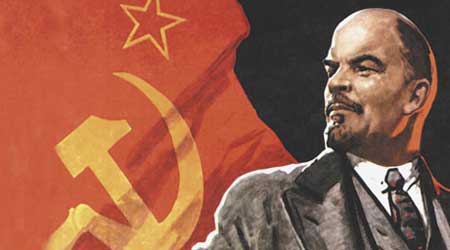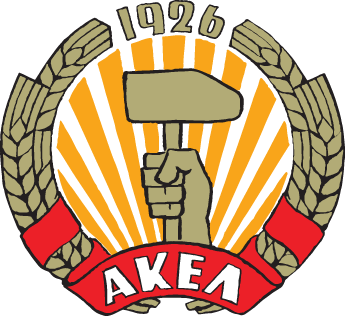
Speech by Sotiroula Charalambous, member of the Political Bureau of AKEL, at the meeting on the101st anniversary of the Great October Socialist Revolution
1st November 2018, Nicosia
Dear guests,
Comrades,
Humanity has to date witnessed many revolts and uprisings. There have been many cases where the oppressed, no longer willing to stand the oppression, sought to take matters into their own hands, for the peoples themselves to become the masters of their own fate. Numerous examples can be cited: the revolt of Spartacus, the French Revolution and the Paris Commune. The struggle against all that is rotten and backward, the struggle for the new that will drive human existence forward. The Great October Socialist Revolution was and remains the landmark of these uprisings.
101 years onwards and October 1917 remains the great moment when the poor and oppressed in a momentous way broke their bonds by demanding that they themselves should be the real masters of their fate.
The October uprising was not some spontaneous action and a decision that was imposed by a handful of adventurers on the Russian people as certain falsifiers of history are trying to convince us, especially since the collapse of the Soviet Union and the other socialist states.
“History will not forgive revolutionaries for delay, when they can win today (and probably will win today), but risk losing a great deal tomorrow, risk losing everything”. Lenin towards the Central Committee of the Party of the Bolsheviks, 24 October 1917
This decision for the October uprising was preceded by preparations that was based on the socio-economic and political given conditions of that period.
The October Revolution was the explosion of the great contradictions that the Russian society, but also the people as a whole were living through.
Capitalism’s fundamental contradiction at the imperialist stage of its development was intensifying acutely. Production was increasingly being socialized, whose result however were being enjoyed by the privileged few.
In Russia these contradictions are expressed in a particular way. On the one hand there are the powerful remnants of feudalism, especially with regards the land and its ownership. On the other hand, monopoly capitalism is developing. The feudal lords and the Tsar have the power, the ruling class the economic power, but not the political power. The people, workers and landless peasants suffer, living in poverty and hunger, deprived also of democratic rights that exist in the capitalist countries of that era.
The First World War intensifies these contradictions even more. The poor workers and peasants in Europe find themselves fighting each other on the battle fields. They are dying in frozen trenches for whom? For the Russian, German and English imperialists, to split-up and divide their own world for their own interests.
The decision of the Bolshevik’s party to proceed with the seizure of power was preceded by the February 1917 revolution and the creation of the interim government.
In October 1917, Lenin’s recommendation that they must move forward because they could be victorious was the response of the communists of Russia response to the Russian people’s concern who, between the Revolution of February and the October Revolution, realized that it could not expect anything from the ruling class, that it had to try to take the next step so as to take control of its destiny.
This consequently was the only way the Russian people could fulfill in practice the key demands of the popular masses for peace and the redistribution of land.
The October Revolution was and remains the most prominent of revolutions because it dared take the great leap forward, the leap to the future. For the first time, the working class is at the forefront of history and puts in the front line of the struggle the elimination of human exploitation, the building of a society where the labour of the many will be fairly and equitably distributed; where basic human rights such as education, health, housing will be guaranteed for everyone; where each person can be a participant in cultural and intellectual creation and where race and gender will not be an element of discrimination.
The Party of the Bolsheviks was the inspiration and leader of this struggle which with consistency, perseverance and militant revolutionary spirit and manner worked among the masses of impoverished workers and peasants to win their hearts and minds and to turn hatred and frustration into the waging of organized struggles and actions.
This is the great historical legacy of October. The October 1917 Revolution made the idea of a socialist society something tangible. It helped the working class around the world to realize that it can indeed break its bonds; that it can hope and aspire for something better, more humane and just than the barbaric capitalism it lives in.
This hope which the October Revolution gave to the poor and the destitute had nothing whatsoever to do with the hope projected by visionaries, idealist philosophers or religions about a paradise after death, because the October Revolution showed the oppressed that they themselves are the only ones that can change their life and destiny through the power and strength of their own class, through organization and struggle.
The messages of October influenced the development of the workers movement throughout the world. The working class formed its own parties, fighting at the forefront of working people’s struggles for a better life, for democracy, social and labour rights, for socialism.
The establishment of the Communist Party of Cyprus in 1926 was the response of the Cypriot proletariat and poor peasants to the need to attain a political expression, to organize themselves for themselves and to struggle against the twin enslavement.
The struggle for the revolution to prevail was not at all easy. Local and foreign reaction joined forces to overthrow the young socialist state from the very beginning. The Russian people, however, withstood the attacks, protected the young revolution and proceeded gradually in the construction of a socialist society.
In recent years, more specifically after the collapse of existing socialism, a lot has been written on the one hand to falsify the real situation that existed in the former socialist countries and on the other hand to portray the revolution in Russia and socialism as a mistake, a deviation from the natural development of history that supposedly cannot in any way be repeated.
Despite the distortions and lies, it cannot be ignored that in the countries where socialism was built there were significant gains and rights for the people. Education, housing, health for all and guaranteed work are just some of them; gains and rights that are neither safeguarded, nor universally applied in modern neo-liberal capitalism, but which on the contrary are increasingly being commercialized.
At the same time it cannot be forgotten that, particularly after the Second World War, the socialist countries example was a motivating force in the struggle of the working people of Western European for labour and social rights. Besides, the best answer to all those who are trying to denigrate, tarnish, and if possible, to erase the history of Russia and the other socialist countries up to 1990 comes from the very people of these countries.
Is it one wonders a coincidence that in numerous public opinion polls conducted in former socialist countries, the generations who lived under socialism in particular, reply that life was better back then.
But permit me to point out one more thing. If everything was so bad, the people suffered, they didn’t have rights as the architects of anti-socialist propaganda say why then do they seek to convince us that the revolution of the Bolsheviks was a discrepancy and a historical mistake that will not be repeated?
Is what worries the ruling classes the fact that today’s proletarians and oppressed, those suffering from inequalities, poverty and the impoverishment of modern capitalism, those who are the victims of the modern barbarity of war waged for the control over the world’s wealth, will eventually see in the example of October the possibility of taking another alternative path other than the one the ruling classes are trying to impose on them as the only way?
We do not disregard the achievements and positive results of the first attempt to build socialism, as we do not also deny that during this process mistakes were committed; mistakes that led to its deviation from the ideas that October gave birth to, namely a bureaucratic and dogmatic perception of Marxism- Leninism and to its distancing from the people and their valid needs. In contrast, however, to all those who ended up either engaging in aphorisms and abandoning the idea of socialism or in the falsification of history, AKEL chose to make a dialectical analysis and to draw those lessons that would help us keep the vision for a better and fairer world alive, and to continue the struggle in our own specific conditions for liberation and the reunification of Cyprus and our people, for social justice and socialism.
Speaking of the October Revolution, the impact and legacy of the Soviet Union, we cannot but point out the enormous contribution of the Soviet people to the struggle against Hitler-Fascism. 20 million Soviet citizens gave their lives defending the socialist homeland, freedom and humanity, against the atrocity of Nazism and barbarism.
The conscious and coherent attempt that has been ongoing in recent years by the ruling circles of the European Union to equate fascism with socialism, that is to say to equate those who fought fascism with those who started it, is truly provocative and constitutes a vile falsification of history.
As promising and motivating as the example of the Soviet Union was for the working class, it also operated as a bastion of support and solidarity towards the peoples struggling against colonialism, for independence and national self-determination.
We too are recipients of this support and solidarity. The Soviet Union was steadfastly and consistently on the side of our people’s struggle for a viable solution of the Cyprus problem on the basis of the UN resolutions and the principles of international law, a policy which the Russian Federation continues to pursue today too.
Dear guests and comrades,
Red October remains a bright shining light in humanity’s course towards progress.
It was and still represents a source of inspiration and a pole rallying working people all over the world in the struggle to end exploitation and assert a better world.
It was and still is an orientation for the parties of the working peoples; an orientation that shows us that our role and goal isn’t just to interpret the world, but to struggle on a day-to-day basis – among and for the people – to create the conditions that will lead us to a world of justice, equality and socialism because such a world is possible.




